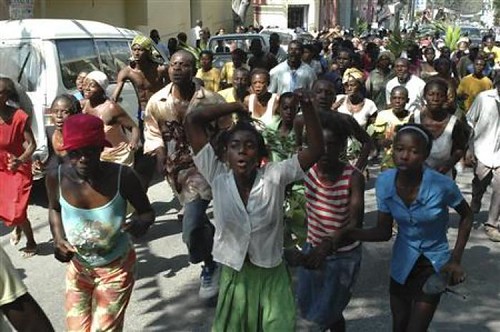
Haitians protest the lack of direct aid to the people of the Caribbean nation. An earthquake struck the country on Jan. 12, yet most people have not received the assistance they need., a photo by Pan-African News Wire File Photos on Flickr.
Havana. April 30, 2012
FROM HAITI: Profit from misfortune
• What are NGO’s doing in Haiti?
Amelia Duarte de la Rosa, special correspondent
No one knows for sure how many non-governmental organizations (NGO) currently remain in Haiti. When the earthquake two years ago brought a wave of humanitarian aid groups to the nation – known as the country of the NGO’s – it became fodder for disaster capitalism. Hundreds of these organizations came to the aid of Haiti and with them the supposed provision of needed services, which today, we now know, never fully reached the Haitian people.
Although the important role these groups played in the areas of health, education and housing is unquestionable, since realistically in an emergency any help is valuable, the catastrophe only worsened Haiti’s dependence on international aid, or more precisely, the capitalist NGO’s who saw the chaos as an opportunity to increase the millions in their coffers.
The wave of solidarity which swept the world was cannibalized by these groups which placed telephone numbers and special bank accounts on their web pages to solicit funds.
The lack of coordination and supervision of the funds, and the precarious condition of the Haitian state, opened the way for one of the greatest concentrations of humanitarian organizations per capita on the planet. The impact of neoliberal policies has turned charity into a profitable business. Under the banner of good works, NGO’s established themselves in hotels and luxurious homes, while almost all of the residents of Port-au-Prince were living in refugee camps, suffering the consequences of the earthquake.
Omnipresent across the country, NGO’s have gained strength and notoriety. Nevertheless, after two years, their millions are not directly linked to support reconstruction or humanitarian assistance. The question must be asked: How effective has work done by NGO’s been? Haiti has seen one penny of every dollar donated, the other 99 cents remain in these organizations’ pockets.
An article circulated by the AP news agency reveals that of the $379 million donated in the United States, 43 cents of every dollar were sent to NGO’s or international organizations such as Save the Children and the World Food Program. Among the primary beneficiaries of U.S. donations were U.S. military forces sent to Haiti during the emergency.
A study by Counterpunch reports that, since 2010, the Clinton-Bush Foundation raised $54 million and allocated two million for the construction of a hotel, the cost of which eventually rose to $29 million. A report published by Courrier International indicates that U.S. NGO’s received the greatest portion of the money donated to help Haiti. The well-known USAID has spent less than 1% of the $412 million allocated for reconstruction in Haiti.
The United Nations has reported that of the $2.4 billion allocated for humanitarian operations, more than 30% has been returned to the donating countries to pay citizens of these countries involved in the response to the disaster.
So much money given as charity and only an infinitesimal portion has reached those meant to benefit. How much, in fact has the Haitian government received? In recent statements, President Michel Martelly decried the fact that NGO funds have been used to acquire vehicles and luxury homes, while, of the $5.3 billion promised to his administration, only $1.2 billion has actually arrived. Not even the President can say for sure where the funds have been invested by the NGO’s supposedly working on the country’s reconstruction.
The current government has categorically stated the necessity of its receiving these funds in order to better manage their allocation and, in the event that an NGO is funded, its representatives must meet with authorities to be informed of the priorities established by Haitians.
The real question lies in the administration of the resources raised by these organizations. The issue is complicated. On several occasions, Martelly has said that Haiti does not want anything for free. In the struggle for sovereignty, opportunist charity is not an option.
1 comment:
Thanks for the info
http://www.sahara.in/
Post a Comment